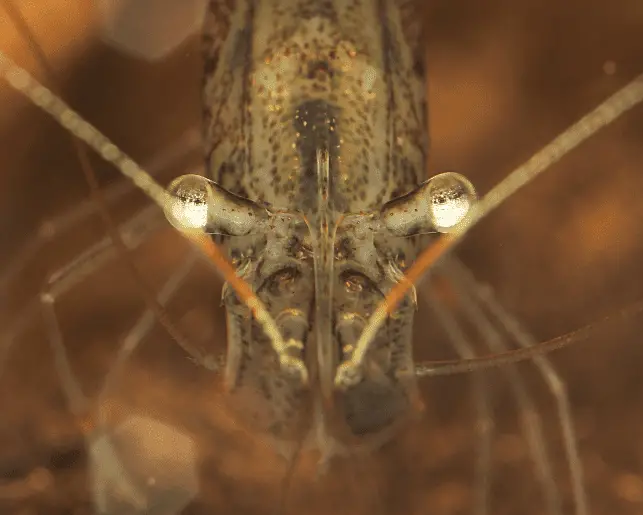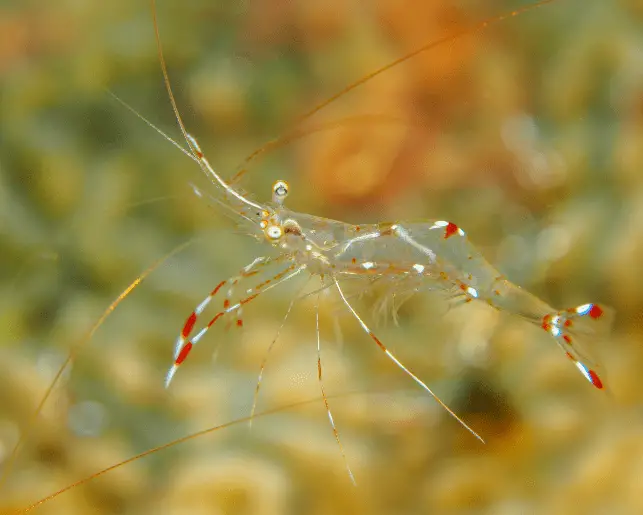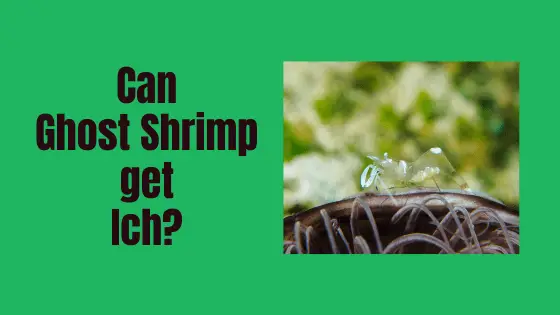Owning an aquarium is a fun way to add some life to your home or office. But there are many factors to consider, including outside organisms like ich that can get into your fish tank and cause problems. People who own ghost shrimp may wonder if they can get ich?
Ghost shrimp are able to carry ich and can spread it to other fish, especially if the shrimp have just been introduced to your aquarium. But they usually are not negatively impacted by it. Be sure to examine ghost shrimp before adding them to an aquarium if you have any suspicion of ich.
This article will look at what ghost shrimp are, why ich is not a significant concern for them, how you treat ich if you have an outbreak in a shrimp tank, and whether or not ich goes away on its own without any outside treatments.
What Are Ghost Shrimp?

With all the different types of fish and shellfish available, you have plenty of choices for what you want to have in your aquarium. One popular choice for many people is ghost shrimp. So what exactly is a ghost shrimp?
Ghost shrimp are shrimp with clear, transparent bodies that make them look unique and, fittingly, like a ghost. There are multiple different species of shrimp that share this characteristic but are grouped by the nomenclature “ghost shrimp” due to this shared ghost-like similarity.
Ghost shrimp are commonly known to be from a few different species of shrimp, but there is one that is most commonly sold for fish tanks and aquariums. The feeder shrimp, or Palaemonetes, is the petite, docile, and nearly transparent creature found in many offices and homes’ fish tanks. Ghost shrimp are a perfect addition to any aquarium because they are not aggressive towards other fish.
What Is Ich?
If you have ever seen your fish or shrimp with white spots on them or noticed a sudden behaviour change, it is cause for concern. These symptoms could very well indicate the presence of ich.
Ich is short for Ichthyophthirius multifiliis. It’s a parasitic ciliate, or microscopic organism, protozoa with hair-like features. Ich is a parasite for certain fish and shellfish species and affects fish that live in freshwater environments in various and sometimes detrimental ways.
Most ciliates are free-living organisms, and only a few are parasitic. Ich is one of the most commonly found parasitic ciliates. Another term for ich is white spots disease due to the marks associated with the skin and cell damage given by the parasite.
Tropical fish are particularly prone to ich, and other symptoms include them being more reclusive, rubbing against the aquarium or objects inside, and a decreased interest in food.
Ich is one of the most common issues when owning aquarium fish and shellfish. If you have any reason to believe that a batch of ghost shrimp you are adding to a new or existing aquarium has ich, it is necessary that you diagnose whether or not it really does.
Can Ghost Shrimp Get Ich?
Ghost shrimp can get ich. However, they do not host the parasite and do not develop severe symptoms. Therefore, it isn’t a serious issue for them. However, ghost shrimp can spread ich to other fish when first introduced to them, and it can negatively affect those fish.
How Do You Treat Ich in a Shrimp Tank?
Suppose you notice any signs of ich in your ghost shrimp; you should know what to do. While most shrimp are not affected by ich, there are some cases where shrimp are, and it is best to attempt to get rid of them. So how do you treat ich in a shrimp tank?
Several products on the market will treat ich effectively in a shrimp tank. Ich Attack is the very best all-around product that will treat ich without harming your shrimp or plant life. Other products like Nox Itch work but may be harmful in high doses.
Other methods like salt and warm temperatures can work if you do not want to use an ich-attacking chemical. But you should be aware that your shrimp are freshwater or saltwater shrimp and if the plants in your tank can handle the saltwater approach. Not all aquarium plants can tolerate salt added to the water.
If your ghost shrimp get ich in a shrimp tank, the safest overall solution is Kordon Ich Attack (available on Amazon.com). This product works even on weak or scaleless fish. The only drawback is that it might take longer to work than other products, so you may want to contact your local expert if you have a more severe case.
Will Ich Go Away on Its Own?
If you ever have a round of ich in your shrimp tank, you may have successfully used salt or another chemical mix to treat and get rid of it. But you may wonder if ich can go away on its own?
Ich can only go away on its own if nothing is hosting it. If you have any fish in your tank, ich will not permanently resolve itself. Your fish or shrimp may be asymptomatic during or between outbreaks, but ich will still be present.
Ichthyophthirius multifiliis will not go away as long as it has something feeding it or an active host. Ich can reproduce at an alarming rate, with some saying that as many as 300,000 every day can spawn in the right conditions. This amount of propagation is a staggeringly fast level that makes it impossible for ich to go away on their own as long as the parasites have something to feed on.

Final Thoughts.
Ghost shrimp are a beautiful addition to any tank or aquarium. While ghost shrimp is not a typical active host to ich, there is the chance that they can be carrying the harmful parasite when they are introduced to new tanks or aquariums.
Because of this, you will want to make sure that you know what signs to look for to diagnose ich and have the proper cleaning solutions if needed. The safest, most reliable brand overall is Kordon Ich Attack, I have a stash of it at home, but there are other products you can use effectively in moderate doses.
Related Articles:
What is a quarantine fish tank and do you really need one?
I suddenly have snails in my tank. Where have they come from?


